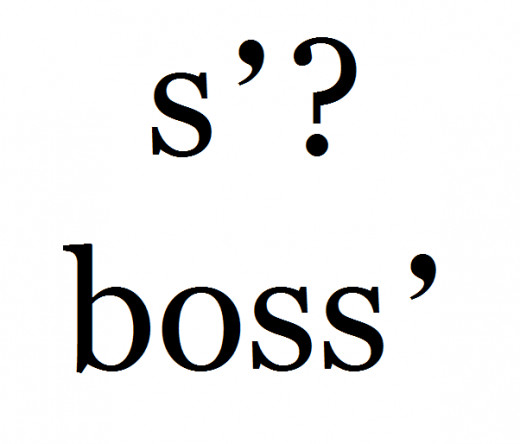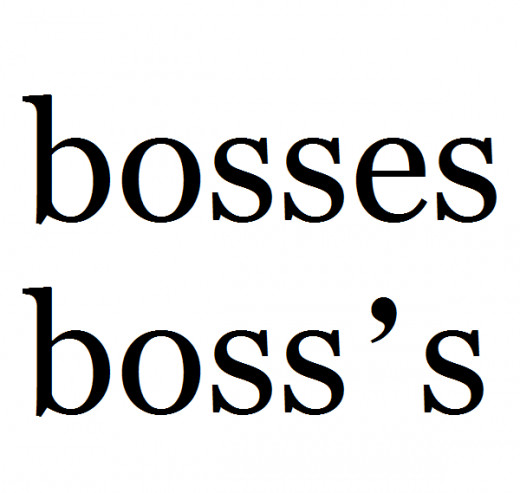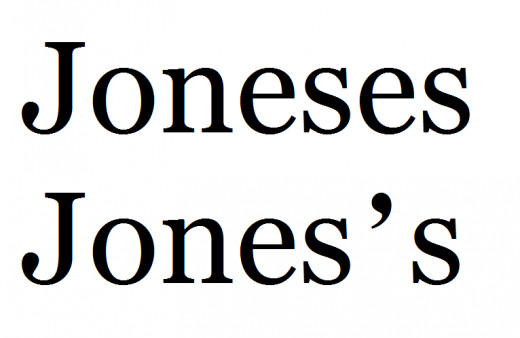Use an apostrophe S for words that end in S
Where do you place the apostrophe in a plural possessive?
A lot of people have learned the lesson "put an S following an apostrophe after the word, unless it is a plural that ends in an S and then just use an apostrophe".
That corollary has done a lot of damage. Just how some people don't read the "well-regulated militia" part of a certain American government document, for proper spelling one is best served reading the whole rule.
This addendum was added because a lot of English words have retained a morphology similar to that seen in modern German, such as ablaut (also known as apophony) or agglutination. Ablaut is found in something like "goose" -> "geese" or "mouse" -> "mice", but in English is just an exception hence no "moose" -> "meece". Agglutination is very often seen in Central Asian languages of the Turkic family, but is similar to the suffix in "child" -> "children".
So this rule was merely amended to stop us from writing foolishness like:
- geese'
- men'
- millennia'
"Millennia" is an example of the second-class of plurals that don't end in S. They're not purely native words, but old or new borrowings from the Greek, Latin, and seldom Italian and Japanese languages. We, as in the whole class of English speakers, are inconsistent with these. We don't say "datas" but do use "data" for the singular (instead of "datum"), but we do say "forums" instead of "fora". We say "pizzas" instead of "pizze", but we know that saying "macronis" or "spaghettis" is wrong, but few refrain from "paninis" and even fewer dare to say "panino". We say "ninjas" but much more rarely "samurais", more likely to phrase it "six or eight samurai".
The goal was to remind folks that though these words are plurals, since they do not end in an S, they still get treated like a singular noun.
- the geese's feather
- the men's geese
- the millennia's ennui
- the data's corruption
- the pizze's basil was a little too strong, if I may say so
- the samurai's katana
But, somehow or another people started leaving out certain keywords here and acting as if the rule were read: "put an S following an apostrophe after the word, unless it ends in an S and then just use an apostrophe".
And this, ladies and gentlemen, has given us nonsense like:
- My boss' unreasonableness.


Pronounce possessives like plurals
How does one even pronounce "boss'"? It's ridiculous.
You're following a rule that doesn't exist. The possessive of boss is two syllables, that's not debatable like some words are. If it is pronounced with two syllables it is also spelled with two syllables. It needs "boss's". "baws-iz" -- doesn't that just feel right?
(This, like any rule of punctuation, by the way is a rule of spelling, not a rule of grammar. But that's a whole different topic.)
One handy reminder is that the syllable structure of most common nouns is the same for plurals and possessives. They are, essentially, homophonous.
- Rose's roses.
The possessive of a singular noun gets an apostrophe S, regardless of the last letter
It's not just an actual "S" that trips people up. It's /s/ sounds, too, like a Z or an X (when it's pronounced /ks/). Or also words that end in an S we don't pronounce or are weird in some way we can't put a finger on. Which is a nice way of saying they're probably French.
So, for the record: For the possessive of every singular noun, add “'s” – regardless of the last letter or the last sound.
- my uncle's daughter
- my niece's father
- James's daughter
- Doris's father
- Alex's cousin
- Alvarez's city
- Des Moines's mayor
- Du Bois's writings
- Bordeaux's trousseau
An exception to apostrophe S for singular nouns
There is one pesky exception to the above rule, but its dumb and can be ignored/forgotten unless you write for a living. Hell, even if you do write for a living.
According to every who writes for a living about writing for the living, for my conscience' sake, please remember that a finite set of abstract nouns ending with an /s/ sound that are followed by the word "sake" do not get an extra S. For goodness' sake!
These words with an orphaned apostrophe are pronounced however you choose. I highly suggest: ɬanvairpuɬɡwɨ̞ŋɡɨ̞ɬɡoɡɛrəχwərndrobuɬɬantɨ̞siljoɡoɡoɡoːχ. You'll become very popular.
Surname Exception to Apostrophe S for singular noun
You may add only an apostrophe if the possessive is pronounced the same way as the non-possessive plural, frequently seen in a surname that is homophonous with a common noun or another proper noun.
- Henry Louis Gates' book
But this is not necessary. It is accepted because of the confusion with the word for a door in a fence. However, this is most frequently pronounced "gayts-iz" and in the opinion of more avant-garde spellers, should be "Gates's"
Another frequent surname exception is somewhat related, and that is English language names that derive from Welsh patronymics. That's a fancy way of saying those last names that are first names, but with an "S" at the end, like "Davis, Peters, Michaels, Daniels, etc."
Fun Fact: The very common surname "Jones" is also a Welsh-derived patronymic, but harder to recognize than "Peters", as it means "John's [son]". If you think it is common in the United States or UK, try going to Wales, where almost 6% of the population has this name.
How would you make the possessive?
Doris has a dog.
Possessive Apostrophe S for Proper Nouns and Classical Names
Official names of places, companies, organizations, should not be altered.
Not "not altered" like how we say "St Jude's Hospital" when were too lazy to say "St Jude Children's Hospital", but not altered in that we should say and write "St Thomas' Hospital" regardless of how we feel on the subject, because that's what it's called.
Many writers on the subject, such as Strunk and White, often refer to certain "classical" names that get special treatment. "Classical" in this sense tends to revolve around Greek transliterations of Hebrew and Egyptian names. As Strunk and White didn't want to recede from their battlecry of all 's all the time, they suggest rewriting the sentence, hence the familiar phrases:
- Moses's laws -> The laws of Moses
- Jesus's disciples -> The disciples of Jesus
- Isis's temple -> The temple of Isis
If you wanted to say "Hercules's actions incited Zeus's wrath", you'd be wrong!
"Hercules" is the Latin version of the Greek name "Heracles" and you're mixing and matching with the Greek "Zeus" instead of the Roman "Jupiter".

Proper nouns are pronounced like plurals and spelled like possessives
If you are stuck thinking of how to possessivize a proper noun like "Jones" just think how you would pronounce the plural if there were two people named Jones you wanted to refer to. Would you say:
- The Miller are coming.
- The Millers are coming.
- The Jones are coming.
- The Joneses are coming.
If you would never say #1 in place of #2, there should be little reason to doubt your instincts and say #3 instead of #4.
Its - No apostrophe possessive
Finally, just a quick reminder while we're on the subject of possessives and Ss and apostrophes: The possessive itshas no apostrophe.
It's is the contraction for it is or it has. It's OK to say it out loud every now and then to make sure you are using the right form. For some pronouns (hers, yours, ours, theirs, whose) they decided they don't need or want apostrophes, and there's nothing we can do about that. Pronounces have a very strong lobbying group and they decide their own spelling conventions.








